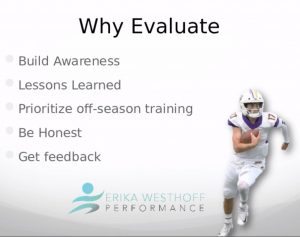

Athlete Season Performance Evaluations
High School FootballLEVELUP INSIDERS July 28, 2020 Erika Westhoff 0

Mental training for elite athletes means you must do a post season performance evaluation. Post season evaluations are a necessity for peak performance.
During a sports season and even now during this pandemic, there are inevitable ups and downs. Every player can think back to great moments on the field and moments they wish didn’t happen. Regardless, part of the learning process as an athlete is to thoroughly evaluate performance.
_______________________________
#SPORTSTARSNOW
GET the FREE SportStars NOW app today.
Follow SportStars on Twitter & Instagram | Like us on Facebook | Subscribe!
_______________________________
Why Evaluate?
Build Awareness – Evaluate to build awareness on the improvements and lessons learned during the season.
Lessons Learned – Avoid repeat mistakes.
Prioritize-Off Season Training – Look at off-season so you’re in the best possible shape for the next season.
Be Honest – Articulate the things that didn’t go as planned and be honest with the things that worked.
Get Feedback – Evaluate yourself as an athlete and then have the coach evaluate. Compare the two and see what things match up.
What to Evaluate
List successes of the season – Looking at what was successful in the season can be really challenging for athletes. This is because when things go wrong, it leaves a bigger imprint on the memory. When things go right, we move onto the next thing. Our successes are huge building blocks – be clear on what worked so it can be used in the future.
Big and small accomplishments – Acknowledge all the little things, such as working hard on days you’re exhausted or improving communication skills with your coach.
Why were you successful? – Determine what caused that success. Was it something done in training that week? Extra work in the weight room? Keep these in mind to continue to develop and grow as an athlete.
Skill development – See if you were able to execute a skill from practice to an in-game situation.
Consistency – Identify areas where you were really consistent this year compared to in the past.
Challenges – Think about the things you know could have done better and the things you didn’t work on.
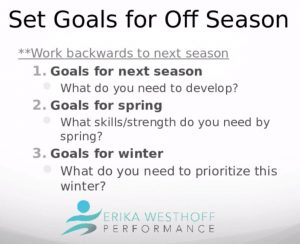
Mental training strategist, Erika Weshtoff, explains how to set goals to attain peak performance in your sport.
Set Goals For Off-Season
1. Goals for Fall
It’s best to start with the biggest, long-term goals first and work backward to goals for the near future. Start with goals for next season. Based on your evaluation of what you were successful with and what you were challenged by, make a list. Identify what those goals are and where you want to be by next season.
2. Goals for Spring
Write down the skills and strengths you need by spring, based on where you want to be by August.
3. Goals for Winter
Focus on what you’re going to work on in the winter. This should be more immediate goals, but working towards things that take longer to develop.
Prepare For Next Season
Who To Train With – As you come up with your list of goals, think about who can you train with and who do you need to train with? Tap into your community and those around you. Coaches, teammates, yourself, and private trainers or mentors should be able to help.
Where To Train – Think about the physical places you’ll train. This can include:
- School – weight room, track, field
- Other sports – (example – track for speed)
- Gym/private facility
Take everything you’ve reflected and learned from your evaluations and start thinking about the practical pieces to become a better athlete.


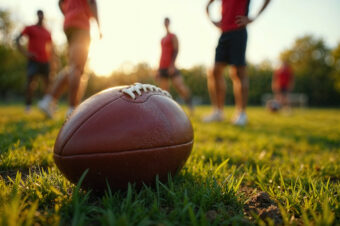



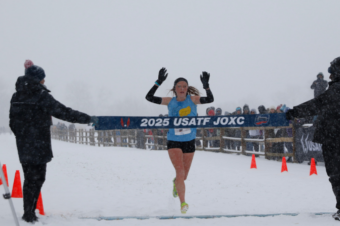
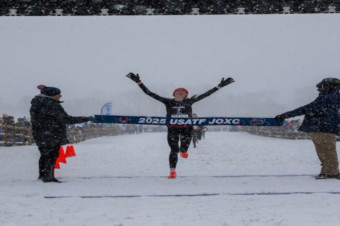

No comments so far.
Be first to leave comment below.